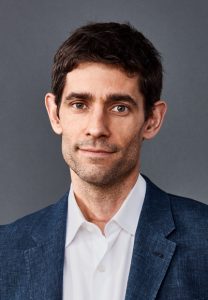Routine is important to Nicholas Thompson.

At 6 a.m., even in the midst of a global pandemic, he wakes before anyone else in his family to go on a run.
By 7 a.m. he’s making breakfast, and around 8 a.m., he’s at his job. For Thompson, that means working remotely as the editor-in-chief of Wired magazine.
Thompson is forward-thinking. In his capacity as editor-in-chief, he’s published pieces for Wired on how technology helped him to run a faster marathon, how Microsoft is partnering with Land O’Lakes to equip farm cows with sensors to improve yields, as well as multiple stories on the corporate turmoil ravaging Facebook.
Even the story of how Thompson became interested in journalism is fascinating: After getting his start writing opinion pieces for his college newspaper, he traveled to Morocco after graduation and was immediately kidnapped by drug dealers.
“I was released; it was fairly innocuous,” said Thompson, a journalist, musician and author. “But I wrote about that experience and other experiences that I had in West Africa, and I was published in The Washington Post. That was fun. So it was a combination of liking traveling, liking talking to people, liking journalism. Journalism is a great job for young people: You get a lot of interesting assignments and responsibilities at a young age.”
At 10:45 a.m. EDT Monday, July 20, on the CHQ Assembly Video Platform, Thompson will do a deep dive into “The Most Important Story: Science and Technology,” a lecture that will kick off the Chautauqua Lecture Series’ Week Four morning lecture theme: “The Ethics of Tech: Scientific, Corporate and Personal Responsibility.”
“My talk (is going to be) about the biggest debates in tech right now,” he said. “It’s a little bit of the history of the tech industry, and how we ended up where we are at this moment.”
“How” is the operative word there — Thompson said that in his lecture, he intends to both pose and investigate questions like, “How do we think now about how work will change, how artificial intelligence will change? How do we think now about our communications platforms? How do we think now about the trade-offs between security and privacy?”
That last question is especially relevant, given the COVID-19 pandemic and its ripple effects in the tech industry.
“The big issue — and we’re seeing it less in the United States right now — is contact tracing,” he said. “(It’s) whether not we’re willing to give up location data, whether or not we’re willing to let governments or phone companies track our location and store our location via Bluetooth, in exchange for some help in identifying how the virus spreads, and limiting its spread.”
That’s a big problem, Thompson said, because as “we go through a second wave, and as we go through a response, there’s going to be moments where we have to choose between safety versus privacy, and that’s a big choice.”
On a personal level, the pandemic has brought swift, discordant change to multiple areas of Thompson’s life.
“There’s the question of, ‘How do I manage the staff of Wired?’” he said. “We’ve gone entirely remote. There’s the question of, ‘How do we deal with the new economic realities in journalism?’ There’s the question of me personally — I have three children who don’t have school or camp, and I live with two grandparents who are at high risk for coronavirus.”
It’s the little things that keep him going, despite these radically different realities.
“I try to structure my days to do the best I can with running Wired, and to do the best I can with raising my children,” he said.
This program is made possible by “The Lincoln Ethics Series” funded by the David and Joan Lincoln Family Fund for Applied Ethics & The Winifred C. Dibert Fund for Chautauqua.




